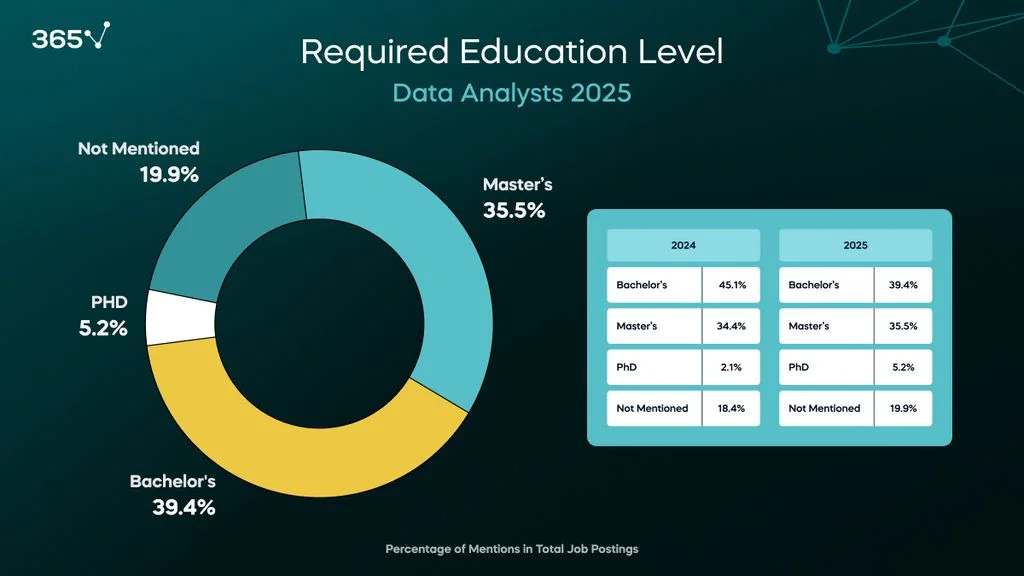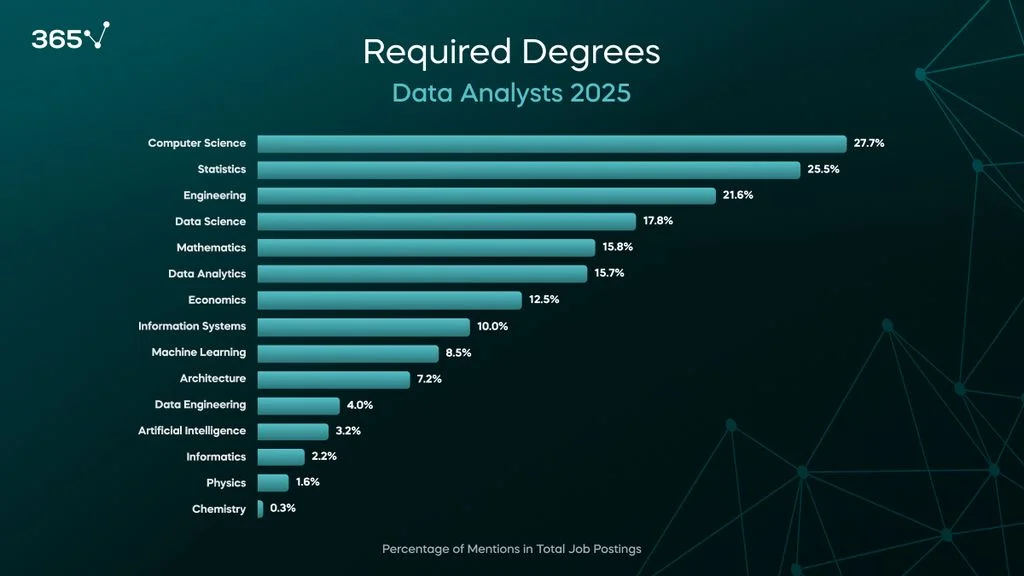Data analysts in the age of AI are quite different from the statisticians we saw during the early 2000s data boom. Back then, a degree in statistics or math was the standard pathway into a data analyst role.
With AI now automating everything from data collection to statistical testing, many of the routine tasks are no longer essential parts of the job. But rather than making the role obsolete, this shift is transforming it.
According to Alteryx's 2025 report, 70% of analysts say that AI automation makes their work more effective, while 87% feel they bring more strategic value than ever.
So, what degree do you need to be a data analyst in 2025?
We analyzed the job market to find out exactly what employers are looking for—and whether you even need a degree at all.
Let’s look at the data analyst education requirements of 2025!
Table of Contents
- Do You Need a Degree to Be a Data Analyst?
- What Are the Best Data Analyst Degrees?
- Top 6 Degrees for Data Analysts
- Future Trends in Data Analytics Education
- Become a Certified Data Analyst with 365 Data Science
- FAQs
Do You Need a Degree to Be a Data Analyst?
These days, there's a lot of buzz around online degrees and certification programs. But will employers actually hire you as a data analyst if you skip traditional college or university and go straight for certifications?
In other words, do you need a degree to be a data analyst? 
Looking at this year's job market data reveals some interesting shifts in educational requirements.
Bachelor's degrees, while still the most common requirement, have actually seen a notable drop—from 45% of job postings in 2024 to 39% in 2025.
Meanwhile, there's been a small but significant uptick in positions asking for PhDs, jumping from 2% to 5% since last year. Master's degree requirements, on the other hand, have held steady.
While you can absolutely land a data analyst role with a bachelor's degree, the landscape is definitely evolving. For those wondering how to become a data analyst as a long-term career, a graduate degree might give you an edge—though you'll need to weigh that against spending two or more years hitting the books.
But what does this tell us about entering the field without a data analyst degree?
Interestingly, about 20% of job listings we looked at don't even ask for a specific degree.
These numbers suggest some companies might not be as strict when it comes to traditional schooling. Many tech fields value hands-on experience over formal education.
If you've got the skills and a solid portfolio to back them up, you might not need that diploma after all.
Want to build your project portfolio and land your dream role? Check out 365 Data Science's preset projects. You can showcase your skills using real data—no need to brainstorm ideas or search for datasets. Start building right now!
Still, the majority of employers—about 80%—want to see at least that bachelor's degree. So, what degree do you need to be a data analyst in 2025? Let’s see what employers want.
What Are the Best Data Analyst Degrees?
Data analyst education isn’t limited to one specific set of skills. The role requires different combinations of expertise based on your industry and position.
You'll find in our data that there's no single "best" data analytics degree out there—none are mentioned in more than 30% of postings.
Employers look for different educational backgrounds because each brings its own unique strengths to the table. Here's what we found when analyzing the most sought-after degrees.

Looking at job postings from the past year reveals a clear trend: companies want data analysts who can code.
While the proportion of statistics and mathematics graduates (26% and 16% respectively) hasn't changed over the years, we're seeing more demand for computer science (28%), engineering (22%), and data science (18%) majors.
Why the shift? Modern analysis has gotten much more technical—affecting the data analyst requirements.
Companies are investing in data tools and automation, so they need people who can do more than just crunch numbers. Today's analysts need to write complex database queries, handle APIs, and juggle multiple data systems at once.
This explains why computer science and engineering grads are so in-demand right now—they've got the programming skills and big-picture thinking that companies are after.
But here's something to keep in mind: we're also seeing demand for analysts coming from unexpected backgrounds like economics, architecture, physics, and chemistry.
These fields might seem random, but they actually make sense—they all teach you how to think analytically and pay attention to details, which are must-have skills for any data analyst.
Already have a degree but need to learn essential data analyst skills like programming? 365 Data Science’s Data Analyst Career Track covers everything you'll need—from coding to data preparation and visualization.
Top 6 Degrees for Data Analysts
Still need help choosing your data analyst career path? Let's take a closer look at the top 6 degrees for data analysts, along with their pros, cons, and best schools to help you make your decision.
1. Computer Science
- Pros: This degree offers a strong technical foundation in programming and systems analysis—crucial skills for managing and manipulating large data sets.
- Cons: It may not provide in-depth statistical or analytical training specific to data analytics.
- Top Programs:
- Stanford University (US)
- Massachusetts Institute of Technology (US)
- University of Cambridge (UK)
2. Statistics
- Pros: A statistics degree provides core training in data interpretation, probability, and statistical methods, which are directly applicable to data analysis.
- Cons: While this is a strong analytics degree, it may lack focus on data management, computational techniques, and coding that the industry increasingly requires.
- Top Programs:
- Harvard University (US)
- University of Oxford (UK)
- University of Melbourne (Australia)
3. Engineering
- Pros: Engineering provides robust problem-solving skills and a strong grasp of complex systems, valuable in operational data analysis.
- Cons: It’s often less specialized in the specific tools and techniques used in typical data analytics roles, and has much less of a business focus.
- Top Programs:
- California Institute of Technology (US)
- Imperial College London (UK)
- National University of Singapore (Singapore)
4. Data Science
- Pros: This degree is specifically tailored to the needs of data-centric roles, offering comprehensive training in data handling, visualization, and machine learning.
- Cons: It can be overly specialized, potentially overlooking broader business or domain-specific knowledge ideal in a data analyst degree. Also, this is most often a master’s degree.
- Top Programs:
- Columbia University (US)
- University of Edinburgh (UK)
- ETH Zurich (Switzerland)
5. Mathematics
- Pros: Math offers fundamental training in quantitative skills, critical for modeling and analysis.
- Cons: This degree might not cover practical applications of data analytics or programming extensively, and lacks the business context.
- Top Programs:
- Princeton University (US)
- University of Cambridge (UK)
- University of Tokyo (Japan)
6. Data Analytics
- Pros: A data analytics program directly focuses on analytics, teaching students how to extract and interpret data, often with a business focus.
- Cons: It may not provide as deep a technical or theoretical foundation as other degrees like computer science or mathematics. Also, this is most often a master’s degree.
- Top Programs:
- Georgia Institute of Technology (US)
- University College London (UK)
- Technical University of Munich (Germany)
Future Trends in Data Analytics Education
One of the most significant trends in data analyst education requirements is the rise of specialized degrees. Our research found an interesting jump in demand for “data science” degrees in the data science job market—from 47% to 70% in just the past year.
This specialized degree surpassed traditional pathways like computer science and statistics—reflecting how the field has matured, with universities finally aligning their programs with industry needs.
Rather than having analysts cobble together courses from different departments, a data analyst degree offers a mix of technical expertise and business insight. Students can now learn not just data manipulation and modeling, but how to transform their findings into valuable business decisions.
So, if you're wondering what degree you need to be a data analyst, specialized data analytics programs might be the future—though they haven't yet dominated the job market as they have in data science.
This evolution mirrors the increasing complexity of data analytics itself. As organizations become more data-driven, they need analysts who can bridge the technical-business divide. These specialized degrees are designed specifically for this reality—creating graduates who are equally comfortable with Python scripts and boardroom presentations, something traditional computer science or statistics programs rarely address.
What's particularly effective about these programs is their practical focus. Many now feature industry partnerships, real-world projects, and dedicated business communication coursework. This comprehensive approach prepares graduates for the reality of modern data analysis, where success depends on both technical excellence and the ability to drive business impact.
Become a Certified Data Analyst with 365 Data Science
At the end of the day, the job market in 2025 is more flexible than ever when it comes to data analyst education requirements.
While a bachelor's degree is still the most common, what really matters is your ability to work with data and solve real business problems. Whether you choose computer science, statistics, or even come from a completely different field, success as a data analyst depends more on your skills than your specific degree.
Ready to enter your data analyst career but not sure where to start? 365 Data Science’s Data Analyst and Business Analyst Career Tracks gives you the exact skills companies are looking for in 2025. You'll learn everything from Python and SQL to statistics and data visualization through hands-on projects. Plus, you'll earn a certification that actually means something to employers. You can learn at your own pace, with access to course updates as the field evolves.
We hope this article has helped you answer the question: What degree do you need to be a data analyst?
If you have any more questions, feel free to message us on our socials! We’re always happy to help.
FAQs

![Data Analyst Job Outlook 2025 [Research on 1,000 Job Postings]](https://365datascience.com/resources/blog/thumb@360_ciqytcbcw5e-the-data-engineer-job-market-thumb-1.webp)



